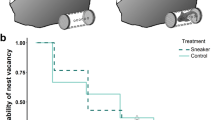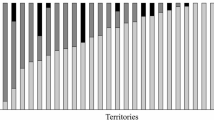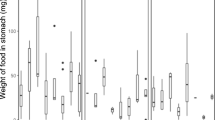Abstract
Theory of parental care evolution predicts that a parent should invest more in a brood when its fitness value is greater than alternative investments such as the parent's own survivorship or future broods. In fish, filial cannibalism (eating one's own offspring) is widespread and represents a challenge to parental care evolution. In this study, I investigated filial cannibalism in bluegill sunfish (Lepomis macrochirus). Bluegill are characterized by alternative mating tactics referred to as "parentals" and "cuckolders". Parentals delay maturation, construct nests, court females and provide sole parental care for the developing offspring. Cuckolders mature precociously and parasitize parentals using two tactics called "sneakers" and "satellites". I found that parentals that obtained fewer eggs during spawning appeared more likely to completely cannibalize their brood (total filial cannibalism: P=0.07), regardless of their condition. Among parentals that provided care, partial cannibalism was greater during the egg phase as compared to the fry phase of care, but it was unrelated to brood size. Throughout the care period, parentals in better condition were less likely to partially cannibalize their brood, indicating that parentals use cannibalism to replenish energy reserves. Independent of condition, parentals that were cuckolded more were more likely to eat part of their brood. This relationship was evident only after the eggs had hatched, which is consistent with data showing that parentals can use olfactory cues produced by fry but not eggs to assess their paternity. This latter result proposes that parentals may be selectively culling cuckolder offspring from their nest. These data provide empirical support for parental care theory, and the first evidence for the importance of paternity on cannibalistic behavior.




Similar content being viewed by others
References
Belles-Isles JC, Fitzgerald GJ (1991) Filial cannibalism in sticklebacks – a reproductive management strategy. Ethol Ecol Evol 3:49–62.
Burke T, Davies NB, Bruford MW, Hatchwell BJ (1989) Parental care and mating behaviour of polyandrous dunnocks Prunella modularis related to paternity by DNA fingerprinting. Nature 338:249–251
Cargnelli L, Gross MR (1996) The temporal dimension in fish recruitment: birth date, body size, and size-dependent survival in a sunfish (bluegill: Lepomis macrochirus). Can J Fish Aquat Sci 53:360–367
Cargnelli L, Gross MR (1997) Fish energetics: Larger individuals emerge from winter in better condition. Trans Am Fish Soc 126:153–156
Claussen JE (1991) Annual variation in the reproductive activity of a bluegill population (Lepomis macrochirus): effect of clutch size and temperature. MSc thesis. University of Toronto, Toronto, Canada
Colbourne JK, Neff BD, Wright JM, Gross MR (1996) DNA fingerprinting of bluegill sunfish (Lepomis macrochirus) using (GT)n microsatellites and its potential for assessment of mating success. Can J Fish Aquat Sci 53:342–349
Coleman RM, Fischer RU (1991) Brood size, male fanning effort and the energetics of a non-shareable parental investment in bluegill sunfish, Lepomis macrochirus (Teleostei: Centrarchidae). Ethol 87:177–188
Coleman RM, Gross MR, Sargent RC (1985) Parental investment decision rules: a test in bluegill sunfish. Behav Ecol Sociobiol 18:59–66
Colgan PW, Gross MR (1977) Dynamics of aggression in male pumpkinseed sunfish (Lepomis gibbosus) over the reproductive phase. Z Tierpsychol 43:139–151
Davies NB, Hatchwell BJ, Robson T, Burke T (1992) Paternity and parental effort in dunnocks Prunella modularis: how good are male chick-feeding rules? Anim Behav 43:729–745
DeWoody JA, Fletcher DE, Wilkins SD, Avise JC (2001) Genetic documentation of filial cannibalism in nature. Proc Natl Acad Sci USA 98:5090–5092
Dixon A, Ross D, Omalley SLC, Burke T (1994) Paternal investment inversely related to degree of extra-pair paternity in the reed bunting. Nature 371:698–700
Dominey WJ, Blumer LS (1984) Cannibalism of early life stages in fishes. In: Hausfater G, Hrdy SB (eds) Infanticide. Comparative and evolutionary prospectives. Aldine, New York, pp 43–64
Fitzgerald GJ (1992) Filial cannibalism in fishes – why do parents eat their offspring? Trends Ecol Evol 7:7–10
Gilbert SF (1985) Developmental biology. Sinauer, Sunderland, Mass.
Gross MR (1982) Sneakers, satellites and parentals: polymorphic mating strategies in North American sunfishes. Z Tierpsychol 60:1–26
Gross MR (1991) Evolution of alternative reproductive strategies: frequency-dependent sexual selection in male bluegill sunfish. Philos Trans R Soc Lond B 332:59–66
Gross MR, Charnov EL (1980) Alternative male life histories in bluegill sunfish. Proc Nat Acad Sci USA 77:6937–6940
Hoelzer GA (1995) Filial cannibalism and male parental care in damselfishes. Bull Mar Sci 57:663–671
Hunt J, Simmons LW (2002) Confidence of paternity and parental care: covariation revealed through the experimental manipulation of the mating system in the beetle Onthophagus taurus. J Evol Biol 15:784–795
Jennions MD, Polakow DA (2001) The effect of partial brood loss on male desertion in a cichlid fish: an experimental test. Behav Ecol 12:84–92
Kempenaers B, Sheldon BC (1997) Studying paternity and paternal care: pitfalls and problems. Anim Behav 53:423–427
Kokko H (1999) Cuckoldry and the stability of biparental care. Ecol Lett 2:247–255
Kvarnemo C, Svensson O, Forsgren E (1998) Parental behaviour in relation to food availability in the common goby. Anim Behav 56:1285–1290
Lavery RJ, Keenleyside MHA (1990a) Filial cannibalism in the biparental fish Cichlasoma nigrofasciatum (Pisces, Cichlidae) in response to early brood reductions. Ethology 86:326–338
Lavery RJ, Keenleyside MHA (1990b) Parental investment of a biparental cichlid fish, Cichlasoma nigrofasciatum, in relation to brood size and past investment. Anim Behav 40:1128–1137
Lessells CM (1991) The evolution of life histories. In: Krebs JR, Davies NB (eds) Behavioural ecology: an evolutionary approach. Blackwell, Oxford, pp 32–68
Lindström K, Sargent RC (1997) Food access, brood size and filial cannibalism in the fantail darter, Etheostoma flabellare. Behav Ecol Sociobiol 40:107–110
Manica A (2002a) Filial cannibalism in teleost fish. Biol Rev 77:261–277
Manica A (2002b) Alternative strategies for a father with a small brood: mate, cannibalise or care. Behav Ecol Sociobiol 51:319–323
Marconato A, Bisazza A, Fabris M (1993) The cost of parental care and egg cannibalism in the river bullhead, Cottus gobio L (Pisces, Cottidae). Behav Ecol Sociobiol 32:229–237
Møller AP (1988) Paternity and parental care in the swallow, Hirundo rustica. Anim Behav 36:996–1005
Moore A, Ives MJ, Kell LT (1994) The role of urine in sibling recognition in Atlantic salmon Salmo salar (L.) parr. Proc R Soc Lond B 255:173–180
Neff BD (2001) Genetic paternity analysis and breeding success in bluegill sunfish (Lepomis macrochirus). J Hered 92:111–119
Neff BD, Gross MR (2001) Dynamic adjustment of parental care in response to perceived paternity. Proc R Soc Lond B 268:1559–1565
Neff BD, Sherman PW (2002) Decision making and recognition mechanisms. Proc R Soc Lond B 269:1435–1441
Neff BD, Sherman PW (2003) Direct offspring recognition by parental male bluegill sunfish (Lepomis macrochirus). Anim Cogn (in press). DOI 10.1007/s10071-003-0166-y, published online 28 March 2003
Neff BD, Fu P, Gross MR (1999) Microsatellite evolution in sunfish (Centrarchidae). Can J Fish Aquat Sci 56:1198–1205
Neff BD, Fu P, Gross MR (2000a) Microsatellite multiplexing in fish. Trans Am Fish Soc 129:590–599
Neff BD, Repka J, Gross MR (2000b) Parentage analysis with incomplete sampling of parents and offspring. Mol Ecol 9:515–528
Neff BD, Repka J, Gross MR (2000c) Statistical confidence in parentage analysis with incomplete sampling: how many loci and offspring are needed? Mol Ecol 9:529–540
Payne AG, Smith C, Campbell AC (2002) Filial cannibalism improves survival and development of beaugregory damselfish embryos. Proc R Soc Lond B 269:2095–2102
Pfennig DW, Reeve HK, Sherman PW (1993) Kin recognition and cannibalism in spadefoot toad tadpoles. Anim Behav 46:87–94
Pfennig DW, Sherman PW, Collins JP (1994) Kin recognition and cannibalism in polyphonic salamanders. Behav Ecol 5:225–232
Phillip DP, Gross MR (1994) Genetic evidence of cuckoldry in bluegill Lepomis macrochirus. Mol Ecol 3:563–569
Rowher S (1978) Parent cannibalism of offspring and egg raiding as a courtship strategy. Am Nat 112:429–440
Sargent RC (1988) Parental care and egg survival both increase with clutch size in the fathead minnow, Pimephales promelas. Behav Ecol Sociobiol 24:33–37
Sargent RC (1992) Ecology of filial cannibalism in fish: theoretical perspectives. In: Elgar MA, Crespi BJ (eds) Cannibalism: ecology and evolution among diverse taxa. Oxford University Press, Oxford, pp 38–62
Sargent RC, Gross MR (1985) Parental investment decision rules and the Concorde fallacy. Behav Ecol Sociobiol 17:43–45
Sargent RC, Gross MR (1993) Williams' principle: an explanation of parental care in teleost fishes. In: Pitcher, TJ (ed) The behaviour of teleost fishes. Chapman and Hall, New York, pp 275–293
Sargent RC, Crowley PH, Huang C, Lauer M, Neergaard D, Schmoetzer L (1995) A dynamic program for male parental care in fishes: Brood cycling and filial cannibalism. Behaviour 132:1059–1078
Sheldon BC, Ellegren H (1998) Paternal effort related to experimentally manipulated paternity of male collared flycatchers. Proc R Soc Lond B 265:1737–1742
Sutton SG, Bult TP, Haedrich RL (2000) Relationships among fat weight, body weight, water weight, and condition factors in wild Atlantic salmon parr. Trans Am Fish Soc 129:527–538.
Svensson O, Magnhagen C, Forsgren E, Kvarnemo C (1998) Parental behaviour in relation to the occurrence of sneaking in the common goby. Anim Behav 56:175–179
Trivers RL (1972) Parental investment and sexual selection. In: Campbell B (ed) Sexual selection and the descent of man. Aldine, Chicago, pp 136–179
Westneat DF, Sherman PW (1993) Parentage and the evolution of parental behavior. Behav Ecol 4:66–77
Whittingham LA, Taylor PD, Robertson RJ (1992) Confidence of paternity and male parental care. Am Nat 139:1115–1125
Williams GC (1975) Sex and evolution. Princeton University Press, Princeton, N.J.
Zar JH (1999) Biostatistical analysis, 4th edn. Prentice-Hall,, Upper Saddle River, N.J.
Acknowledgements
I thank Peng Fu and Tamara Janoswick for field assistance, and Mart Gross, Karrianne DeBaeremaeker, Trevor Pitcher and three anonymous referees for helpful comments. Parts of this work were conducted at the Queen's University Biological Station where Frank Phelan and Floyd Connor provided logistical support. The work conformed to guidelines of the Canadian Council on Animal Care and was supported by the Natural Science and Engineering Research Council of Canada.
Author information
Authors and Affiliations
Corresponding author
Additional information
Communicated by M. Abrahams
Rights and permissions
About this article
Cite this article
Neff, B.D. Paternity and condition affect cannibalistic behavior in nest-tending bluegill sunfish. Behav Ecol Sociobiol 54, 377–384 (2003). https://doi.org/10.1007/s00265-003-0645-9
Received:
Revised:
Accepted:
Published:
Issue Date:
DOI: https://doi.org/10.1007/s00265-003-0645-9




